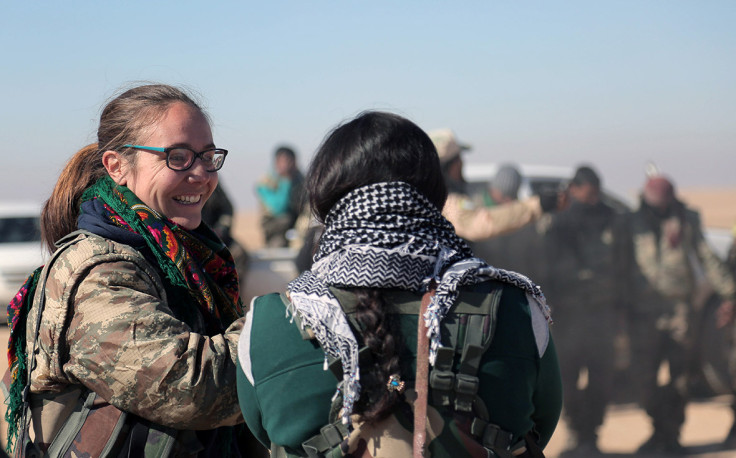British woman Kimberley Taylor has joined ranks of Kurdish fighters against Isis in Syria
Hailing from Blackburn, Taylor is involved in the US-backed operations to liberate Raqqa.
Kimberley Taylor is believed to be the first British woman to be on the front line fighting against the Islamic State (Isis) in Syria.
Sent to the Rojava autonomous region in northern Syria to write an article in March, she decided to remain and join the fight against Isis alongside the Kurdish Women's Protection Unit (YPJ) , the Guardian reported.
The 27-year old woman, who comes from Blackburn, speaks fluent Kurdish, after learning the language as well as regional politics, weaponry and battlefield tactics at the YPJ's military academy for 11 months.
She is involved in the US-backed "Euphrates rage" campaign launched in November to liberate the city of Raqqa, the de-facto capital of the Islamic State in Syria, having recently joined the battlefield as part of the YPJ combat media team.
"Actually most of the time I'm not doing any videos at all, but fighting with the unit when we come under attack," she told the British newspaper in a phone interview, from her frontline base 30km (19 miles) from Raqqa. "I'm willing to give my life for this," she said.

Taylor, who calls herself a "revolutionary" in her Twitter handle and counts singer Lady Gaga among her 398 followers on the social network, appears in good health in a recent video posted on the Kurdish Female Fighters/YPJ Facebook page on 8 February. "This revolution has given me life", she said in the video.
Her reasons to join the Kurds include both the will to fight against the IS terrorists, but also for the kind of ideology – Marxist and feminist – the driving the Kurdish movement. "They call it Democratic Confederalism," she described in the interview. "It's not just, 'Oh, we're anti-capitalist', and doing marches and protests every week. They've completely recreated society putting women at the front of everything."
Our YPJ's British heroine. . . Our YPJ's British volunteer: "This revolution has given me life and l'm very glad to be a part of this fight/ revolution."
Posted by Kurdish Female Fighters/ YPJ on Tuesday, February 7, 2017
The Syrian Kurds began their fight for self-determination in 2011, inspired by the Arab Spring and by the ideology of Abdullah Öcalan, the imprisoned leader of the Kurdistan Workers' party (PKK), which is listed as a terrorist organisation in Turkey.
As part of a coalition including Arabs, Assyrians, Turkmen, Armenians, Chechens, Circassians, Muslims, Christians and Yezidis groups, the Syrian Kurds formally declared the creation of the autonomous region of Rojava in November 2013 and made international headlines when they fought against Isis in the battle for the Kurdish city of Kobani. The all-female YPJ has been particularly effective against the Isis militants who are reportedly afraid to be killed by a woman as that would prevent them from going to heaven.
Taylor is one of the hundreds of foreign volunteers who have joined the Kurdish forces in their fight against the Islamic State in Syria. One of her compatriots, 20-year-old former chef Ryan Lock, lost his life in December while fighting IS militants near the city of Raqqa with the Kurdish People's Protection Units (YPG).
Another international fighter serving with the Kurdish Female Forces is Hanna Bohman, a Canadian-born woman who regularly updates her social media feed with the latest from the battlefield, including the deaths of her fellow fighters. In a post published on Facebook on 2 February, she honoured a fallen Kurdish fighter, who died in a battle against the Turkish army.
The Turkish forces are fighting a war on two fronts in northern Syria, one against the Islamic State around the area of al-Bab, and one against the Kurdish forces. Turkey considers Kurdish groups such as the Partiya Yekîtiya Demokrat (PYD) and the YPG, which lead the coalition of the Syrian Democratic Forces, to be terrorists due to their ties to the PKK.
The US instead considers the Kurdish fighters crucial partners in fighting IS militants and has clearly told its NATO ally that Kurdish cities like Manbij are not the target. But the new administration of President Donald Trump may decide to drop its support for the Kurds, as Turkish President Recep Tayyip Erdogan reportedly asked in his first call with Trump since he was inaugurated president.
© Copyright IBTimes 2025. All rights reserved.






















